December 4, 2019
[Tanzania] Multi-sectoral support rooted in the local community
Facing the Indian Ocean, Tanzania has developed as a trading hub since olden times. Its largest city, Dar es Salaam, continues to be a vital transit trade port, connecting the landlocked nations with their overseas trade partners. JICA built customs facilities called the "One Stop Border Posts" at the borders of Tanzania and its neighboring countries of Rwanda and Kenya. JICA also helped in the construction of the country's first flyover intersection in Dar es Salaam to solve the chronic traffic congestion problem, providing support to streamline both transportation and logistics.
Tanzania is made up of over 120 ethnic groups, but the country has maintained social stability without serious domestic conflicts since its founding. Many Japanese NGOs and corporations operate locally rooted activities in hopes to solve various social issues in the sectors of education, energy and others. JICA cooperates with these sectors to support Tanzania's social development in many ways. Moreover, JICA is promoting gender equality through sports by sponsoring a women's track event since 2017.
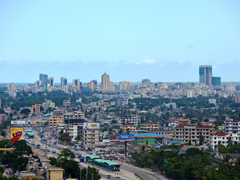
A construction boom continues in Tanzania's largest city, Dar es Salaam, where the population is estimated to reach 10 million in 2030.
Eliminating the bottleneck for smoother traffic and logistics
Driven by population and economic growth, traffic congestion has become a chronic problem in Dar es Salaam, disrupting peoples' lives and economic activities. Under the JICA's grant aid project, Sumitomo Mitsui Construction Co., Ltd. executed the construction of a flyover on Tazara Intersection, one of the busiest intersections in the city. The beautifully curved 425-meter-long bridge was completed in September 2018, thus greatly improving the traffic flow from the city to the port and airport. The 3-year-long construction was accomplished with no accidents, generating a high reputation to the Japanese company's careful attention to safety and work supervision. Moreover, there are many cases whereby local workers who were engaged in this project have transferred their knowledge and experiences to other construction sites.
Traffic congestion is not only a problem in the urban area. Near the country's borders, long lines of vehicles are often seen waiting for customs clearance, posing a heavy burden on carriers. JICA built the "One Stop Border Post (OSBP)" on two points on the borders of Tanzania with Rwanda and Kenya. The OSBPs help simplify the customs procedures and streamline the distribution network. JICA is supporting the establishment of 14 OSBPs in Africa, including the two on Tanzania's borders.
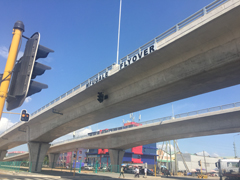
Traffic conditions have greatly improved on the Tazara Intersection with the completion of Tanzania's first flyover.
Power to the people
The population in Sub Saharan Africa without access to electricity is about 600 million. In Tanzania, the electrification rate is low especially in rural areas, where people depend on firewood for cooking and use kerosene lamps for lighting.
WASSHA, a Japanese venture company, provides Pay-As-You-Go solar energy service in villages which have no electricity in Tanzania. Their business is to set up a solar panel in village kiosks and rent the bright, safe and inexpensive LED lanterns. People have re-ceived a variety of benefits from the lantern, including store operations at night, increase in children's study time, charging phones, reduction of kerosene cost, and improvement in health.
JICA invested 300 million yen in this company to support their business. One of the UN's "Sustainable Development Goals (SDGs)" is to "Ensure access to affordable, reliable, sustainable, and modern energy for all." To that end, JICA aims to help solving the energy issue in Africa. JICA also held a side event on clean energy during the 6th Tokyo International Conference on African Development (TICAD VI) in 2016.
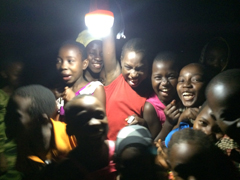
Children in areas without electricity are over-joyed with WASSHA's LED lanterns. Photo courtesy of WASSHA
"Ladies First": The FIRST Track and Field Championship for WOMEN in Tanzania
JICA planned a track and field meet called "Ladies First" for women athletes, in collaboration with Mr. Juma Ikangaa, a former marathon Olympics athlete and PR ambassador of JICA Tanzania office. The objective of the initiative is to discover women athletes in Tanzania, to achieve gender equality, to promote sports and to raise awareness of women's participation in society.
The first event of the women's track and field meet was held at the national stadium in Dar es Salaam in November 2017. A hundred and five selected athletes from 24 regions across the country gathered at the event. A total of 11 events including long-distance running, sprints, javelin throw and shot put, were held in accordance with the rules of the Olympic games. At the same time, several side events to raise awareness of the empowerment of women and sports promotion were implemented such as softball demonstrations and a leg pair race proposed by JICA volunteers. And there was also drama to promote sex education. The event received much applause from all participants.
The athletes who participated commented: "I was proud to participate at an official competition" "I appreciate the opportunity for women athletes" "I want to participate again." The "Ladies First" track and field meet has been held every year since.
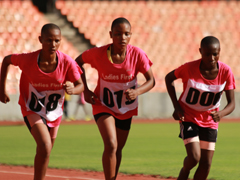
Female athletes participating in the 10,000m race in the first "Ladies First" tournament in 2017
Supporting NGO activities through grassroots partnership project
About half of the young girls in Tanzania reportedly experience pregnancy and childbearing in their teens. Adolescent pregnancy is a serious problem accompanied by a high risk of death and is also a cause for expulsion from school if the girl is a student. The NPO Class for Everyone provides sex education classes at elementary schools and junior high schools to prevent adolescent pregnancy. JICA funds the costs of these activities as part of the grassroots partnership projects. JICA and Class for Everyone also cooperated in holding a side event for preventing early pregnancy at "Ladies First," a women's Track and Field. The event was broadcast nationwide and received an outstanding response.
In Tanzania, especially in rural areas, it is still very common for schoolgirls to end their education at the primary level. In 2016, Group Kilimanjaro Inc. opened Sakura Girls Secondary School, a boarding school to provide secondary education to schoolgirls who have the intention and the ability. About 250 students are currently enrolled. JICA supports the school operation together with the Ministry of Foreign Affairs and many other Japanese companies.
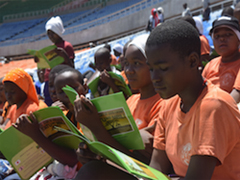
Local schoolgirls invited to the Women's Track and Fields "Ladies First," listening to the storytelling of a picture book on sex education.




scroll